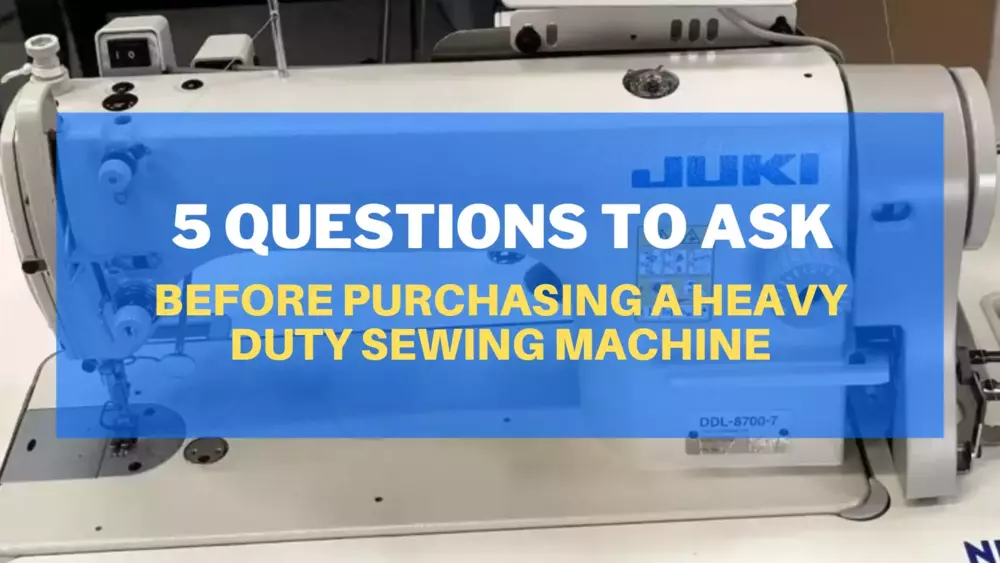5 Questions To Ask Before Purchasing A Heavy Duty Sewing Machine
2022-11-09
Heavy-duty sewing machines are engineered to sew through thick materials such as stubborn leather, heavy webbing, denim, and upholstery. Heavy-duty machines can be used both in a home environment and as industrial sewing machines in a commercial setting. The information will help you find the best sound-quality sewing machine for your individual needs.
According to the U.S. Bureau of Labor Statistics, 116,220 professionals use sewing machines in their work[1]. For the rest of us, we are more likely to use sewing machines for personal use, for hobbies, or for a second job or side hustle. However, you don’t need to be a professional to benefit from a heavy-duty sewing machine's increased speed and longevity. But before spending a small fortune on an industrial-type sewing machine, ask yourself some questions to see if a lower-cost portable sewing machine may be a better choice.
What Are The Top Five Questions To Consider Before Buying Your Next Heavy-Duty Sewing Machine?
- How Much Space Do I Need For A Sewing Machine?
- How Many AMPs Will My Heavy-Duty Sewing Machine Use?
- Where Do I Find Replacement Needles For My Heavy Duty Sewing Machine?
- How Should I Maintain And Clean A Heavy Duty Sewing Machine?
- Where Can I Buy A Heavy Duty Sewing Machine?
 (200 × 200 px) (2) (1).webp)
How Much Space Do I Need For A Sewing Machine?
Before buying a heavy-duty sewing machine, ensure that your space can accommodate the larger size. Most heavy-duty machines are set on tables that measure 30 to 40 inches. In addition, the tables may be height adjustable, so if you are tall, you will want to ensure that the tables can raise to a comfortable height for you. And finally, decide how many heavy-duty sewing machines you will need. If you are planning on operating a small sewing business, you may want to ensure you have enough space for 2 machines, tables, or more!
 (200 × 200 px) (1) (1).webp)
How Many AMPs Will My Heavy-Duty Sewing Machine Use?
Industrial sewing machines can use a lot of energy, especially computerized ones. Select sewing machines that won't overload your circuits when using one in a residential setting. Industrial machines tend to require upwards of 430 watts per hour or more. For instance, JUKI’s heavy-duty engines are rated for 550 watts. Generally, people start running into problems when running multiple heavy-duty sewing machines on one power circuit or when using multiple machines off of a single power strip. Before setting up your sewing room, consider the wattage (stickers can be found on most machines) and check with your electrician to ensure you will not be blowing fuses or creating fire hazards. Do you live off the grid and use solar or battery to power your electronics? In that case, you may need to purchase an inverter to configure the right electrical current to avoid causing permanent damage to your motor and other electrical components inside your sewing machine.
 (200 × 200 px) (3).webp)
Where Do I Find Replacement Needles For My Heavy Duty Sewing Machine?
The needle is one of the most important pieces of a heavy-duty sewing machine. When sewing denim, canvas, leather, or any other tough fabrics, you may need needles that are 100/16 or 120/18. Singer Universal Heavy-Duty Needles are a popular choice available in assorted sizes. Most sewing machines are compatible with various brands of needles, so make sure you know what brands are compatible with yours and where you can find them.
*Pro tip: invest in the highest quality needles whenever possible; having a needle break during a project can cost you considerably in material costs and labor hours.
 (200 × 200 px) (3) (1).webp)
How Should I Maintain And Clean A Heavy Duty Sewing Machine?
Maintaining your machine will ensure that it stays in good condition and works correctly. You should wipe your heavy-duty sewing machine, dust off all the lint, and lose thread after every use. Open the needle plate to access the bobbin and hook area and blow the lint and dust out with compressed air towards a sticky lint brush. Oil your machine regularly with a high-quality sewing machine oil, but only after cleaning the dust and lint off first.
When your machine is not in use, you should keep it covered or packed away to prolong its lifespan of the machine. You will also want to have an authorized dealer service your machine yearly. And of course, always check and follow the manufacturer's instructions in your manual to ensure that you maintain your machine according to manufacturer specifications.
Where Can I Buy A Heavy Duty Sewing Machine?
An extra heavy-duty sewing machine is an expensive investment. Choose a reputable retailer that is an authorized dealer for your chosen brand. Ideally, the retailer will have all of the manuals and specs online - this will let you ensure that you are choosing the right-sized machine (see question 1). A good retailer should also carry replacement parts and accessories for your machine. Bonus points if they carry additional brands - tell you which ones will work for your particular model.
A heavy-duty sewing machine can be an investment that pays for itself. But be sure to do the research before buying!
1. 51-6031 sewing machine operators (2022) U.S. Bureau of Labor Statistics. U.S. Bureau of Labor Statistics. Available at: https://www.bls.gov/oes/curren...





